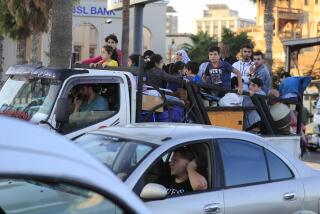Thousands of Lebanese Fleeing Warfare Flood Into U.S., Particularly Detroit Area
DEARBORN, Mich. — Thousands of Lebanese, seeking a safe haven from the horrific shelling of Beirut, have quietly been flooding into the United States since the Lebanese civil war escalated to unprecedented heights last spring, according to Arab-American community leaders here.
Many of the Lebanese are coming to the Detroit area, home to the largest Arab community in the United States.
Already, hundreds, if not thousands, have crowded into this blue-collar Detroit suburb, which has the largest concentration of Arabs in the metropolitan area, joining friends and family members who had left Lebanon earlier in the 15-year civil war.
Arab community leaders here say that at least 50 Lebanese have been arriving in Detroit each week since the all-out fighting between Christian and Muslim factions began in Beirut in March.
No government statistics on the size of the influx are available, and federal officials said Friday they were unaware that the Beirut civil strife has prompted a new flow of Lebanese into this country. “I find that kind of surprising,” said Duke Austin, a spokesman for the U.S. Immigration and Naturalization Service in Washington.
But Arab community groups here seem to be monitoring the movement of the refugees more accurately than the U.S. government is.
“Thousands have come to Detroit since the spring, getting here any way that they can,” said Mosabi Hamed, an attorney with ACCESS, an Arab-American group in Dearborn that is aiding many of the refugees.
Many of the refugees, arriving here with their families or in small groups, have managed to enter the United States on tourist or student visas and lack the right to stay in this country on a permanent basis. Few, if any, are eligible for political asylum or official refugee status in the United States, immigration specialists say.
But few of the Lebanese have any plans to go back.
“The war has been going on for 15 years, but in the last few months the devastation has caused people who have any kind of visa to use it,” Hamed said.
Many first sought refuge in Syria, Cyprus or Greece, and then traveled on to the United States. The recent closing of the American Embassy in Beirut, community leaders and refugees say, has forced them to leave Lebanon to obtain visas to the United States.
“Because of the shelling, people are just leaving,” said Abdalla Moghnieh, a bus driver from West Beirut who has been living with friends in Dearborn since the beginning of September.
Moghnieh left Beirut for Syria to get visas to the United States, but he was allowed to bring only his wife and two youngest children with him from Syria. His five older children had to stay behind and are living with their grandparents in southern Lebanon.
“For the last six months in Beirut,” Moghnieh said through an interpreter, “it was the worst I’d ever seen. It was the heaviest shelling we’d ever seen, because, now, everybody is fighting everybody else.”
For months before he departed, Moghnieh and his wife and children spent most of their time in their basement seeking shelter from the constant bombing. It was hardest on the children.
“The schools are closed, and the kids don’t go out to play, they don’t have any fun, they just hide in the basement all day and all night,” said his wife, Rohme.
Many children who have arrived from Beirut in recent months are “shell-shocked and require emotional therapy,” said Alia Zeidan, a social worker with ACCESS. “Some children who were here on the Fourth of July had to come in for counseling after the fireworks, because it reminded them of what had been going on in Lebanon,” Zeidan added.
Ahmed Hussein, who just arrived a week ago, quit his job with the United Nations refugee relief office in Beirut and escaped from the country with his pregnant wife and two small children.
“We lived in miserable conditions, no electricity, no water, continuous bombing, shelling and snipers,” said Hussein as he fed his youngest child in a Catholic refugee center in downtown Detroit. “We were in the shelters 24 hours a day.”
With legitimate U.S. visas now precious commodities in Beirut, con artists are starting to prey on residents who have become desperate to leave, selling phony visas and immigration papers, Arab community leaders charge. One man, later helped by community groups here, was sold a visa that he thought would gain him entry to the United States, when it was actually a tourist visa for the Bahamas, according to Hamed.
“There are many coming from Beirut, but I know even more who want to come if they can get visas,” said Moghnieh.
Many Lebanese are also trying to enter Canada from Detroit and other border cities, because of Canada’s more liberal eligibility requirements for gaining refugee status. Both Moghnieh and Hussein said they plan to seek refugee status in Canada, although Canada has recently begun cutting back on the number of refugees it accepts.
More to Read
Sign up for Essential California
The most important California stories and recommendations in your inbox every morning.
You may occasionally receive promotional content from the Los Angeles Times.










